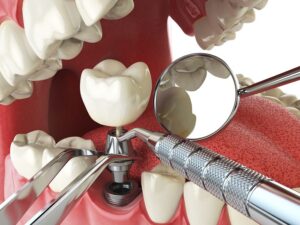Your dentist can help you resolve the complications following tooth loss by replacing missing teeth through personalized treatment. You can find the most comprehensive restorative benefits with implant dentistry tooth replacement.
The dental implant will offer long-lasting and highly effective restoration of the appearance, health, and structure of your smile. But not all patients will qualify for this treatment, so consult with your dentist to determine your eligibility promptly.
If you receive an implant, the treatment will have a very high success rate, but on the rare occasion, an implant might fail. This means the fusion process of the implanted anchor of the device did not occur properly. And the fixture will feel loose and insecure in your smile.
If this occurs, call your dentist right away as this poses a serious risk to your oral health. However, you can make efforts to avoid this dental emergency when you know more about it. Read on to learn more about dental implant failure as well as how to prevent this serious oral health concern after tooth replacement treatment.

Signs of Dental Implant Failure
When your dentist gives you a dental implant, they surgically insert a titanium post anchor into the jaw which will serve as the foundation that sustains the dental prosthetics of the implant. This anchor fuses with the bone in the jaw as it heals, solidifying this secure support role.
Improper fusion of the implant with the jawbone results in dental implant failure. This complication will present with highly noticeable symptoms. Primarily, most people will feel extreme pain around the implant. Pain of any kind is abnormal, so make sure you talk to your dentist about this type of problem. Do not ignore or try to tolerate oral pain.
You might also notice a loose or shifting feeling if a dental implant is failing. The gums might also swell or recede in the event of implant failure. Pay attention to your smile to keep an eye out for these signs.
How to Prevent Dental Implant Failure
Prior to beginning implant dentistry treatment, a dentist will evaluate your oral health. They will check that you have enough healthy gum tissue and jawbone to sustain the implant, ensuring a very low risk of failure of the device. If you lost too much bone or tissue, you might need a graft to add structure that may ultimately support an implant.
You can take action to prevent dental implant failure after receiving the fixture as well. Continue good oral hygiene to ensure other dental problems, like gum disease, do not affect the fit of your implant. You should brush your teeth and floss consistently to prevent major dental concerns.
Follow your dentist’s aftercare guidelines after this procedure as well to maximize the success of your dental implant. Attend follow-up appointments and routine dental check-ups too so that your dentist can check that your implant functions as well as it should.
